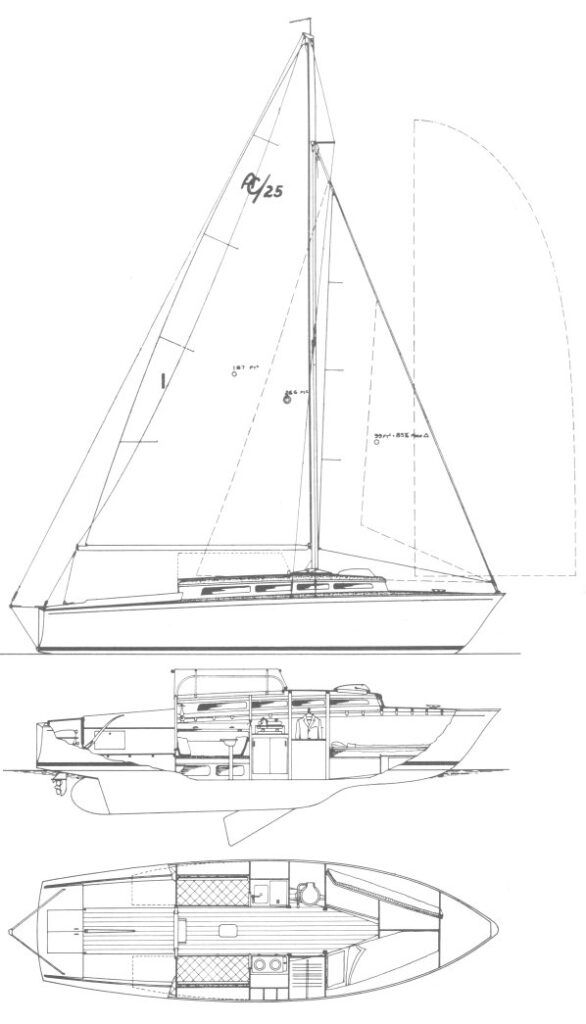The Amphibi-Con is a historically significant American sailboat, notable as one of the earliest trailerable cruising vessels of its size. Designed by the collaborative talents of naval architect Cyrus Hamlin and E. Farnham Butler of Mount Desert Yacht Yard in the mid-1950s, this monohull sloop was conceived with the pioneering vision of accessible "trailer sailing". While the design originated with Mount Desert Yacht Yard, it was later also built by Burr Bros. Boats, Inc., and in Finland, with a few fiberglass versions reportedly produced by Sailstar Boat Co..
Amphibi-Con Information, Review, Specs

- Make
- Model
- Number Built
- 125
- Production Year(s)
- 1954 - ??
The story of the Amphibi-Con begins in the early 1950s, when designers E. Farnham Butler and Cyrus Hamlin collaborated to create a boat that challenged traditional notions of yacht ownership, making cruising more accessible through trailerability. Production officially began in 1954, with Mount Desert Yacht Yard building approximately 123 of these innovative sloops. The design was at the forefront of the burgeoning trailer sailor movement in the USA.
Sailstar Boat Co., which operated independently from 1960 to 1971, also played a part in the Amphibi-Con's history. During its era, Sailstar focused on producing small daysailers and was known for adopting fiberglass in boat construction, a revolutionary material at the time. Although the Amphibi-Con design predates Sailstar's founding, the company reportedly produced a few fiberglass versions, advertising them in 1965, and these Sailstar-built boats were advertised as being significantly heavier than the initial wooden models. The original wooden hull of the Amphibi-Con was often constructed using wood composite for both hull and deck. The vessel's centerboard keel type, combined with its modest dimensions, was key to its trailerable designation, allowing for both shallow draft navigation and easier transport over land.
Sailing Performance and Handling
Given its length overall of just over 25 feet and its design as an early trailerable cruiser, the Amphibi-Con prioritizes versatility and ease of use over pure racing performance. Its moderate waterline length of 21.67 feet contributes to a comfortable motion for a boat of its size. The centerboard design, with a minimum draft of 2.33 feet (board up) and a maximum draft of 4.25 feet (board down), offers excellent flexibility, allowing sailors to explore shallow anchorages while still providing increased lateral resistance for better upwind performance when the board is deployed. As a smaller vessel designed for cruising and trailerability, its handling characteristics would naturally lean towards stability and predictability, making it suitable for coastal exploration and weekend trips.
Accommodations and Layout
The interior layout of the Amphibi-Con, consistent with its design as a compact cruising sailboat, provides fundamental accommodations for overnight stays. Typical arrangements include a V-berth forward, offering sleeping space for two. A basic galley area, often featuring a sink, is usually present to port or starboard. A key feature for its size is the inclusion of two quarter berths, located aft in the main salon, which significantly increases the sleeping capacity. While specific details on finish quality, materials, and comprehensive storage solutions are limited in available information, boats of this era and type often featured functional, no-frills interiors with sensible use of space. Ventilation would typically rely on a forward hatch and possibly a companionway.
Measurements
Construction & Hull
- Construction Material
- Fiberglass/Wood Composite
- Hull Type
- Monohull Sailboat
- Keel Type
- Centerboard
- Rudder
- 1x —
- Ballast
- 1100 lbs
- Displacement
- 3500 lbs
- Water Capacity
- -
- Fuel Capacity
- -
Engine
- Engine Make
- —
- Engine Model
- —
- Engine Type
- —
- Engine HP
- —
- Engine Count
- 1
- Drive Type
- —
- Fuel Type
- —
Rig & Sails
- Rig Type
- Fractional Sloop
- P (Main Luff)
- 26.75 ft
- E (Main Foot)
- 12.17 ft
- I (Foretriangle Height)
- 24 ft
- J (Foretriangle Base)
- 9.5 ft
- Forestay Length (est)
- 25.81 ft
- Main Sail Area
- 162.77 sqft
- Foretriangle Sail Area
- 114 sqft
- Total Sail Area (Reported)
- 277 sqft
- Total Sail Area (Calc)
- 276.77 sqft
Dimensions
- LOA
- 25.42 ft
- LWL
- 21.67 ft
- Beam
- 7.75 ft
- Draft
- 4.25 ft
- Max Headroom
- -
- Air Draft
- -
Calculations
- Hull Speed
- 6.24 kn
- Pounds per Inch Immersion
- 600.08